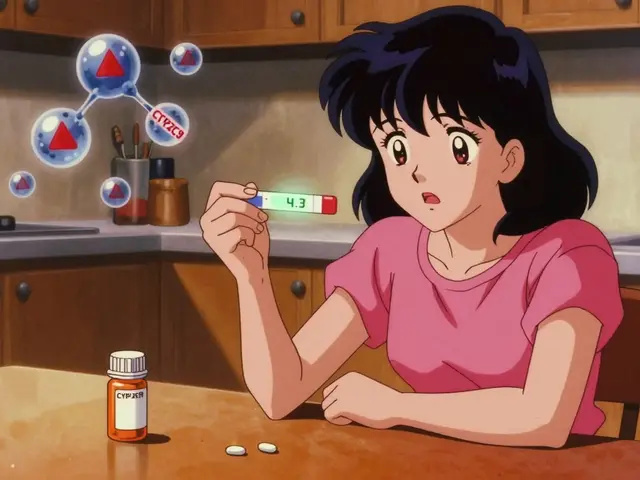Understanding Caffeine and Its Effects on the Stomach
Before diving into the ways to manage stomach-ache caused by caffeine intake, it is important to understand why caffeine can cause discomfort in the first place. Caffeine is a natural stimulant found in various foods, drinks, and medications, such as coffee, tea, and chocolate. It affects our central nervous system and can lead to increased alertness, improved mood, and enhanced concentration. However, consuming too much caffeine or being sensitive to it might result in side effects, including stomach-ache, jitters, and insomnia.
When caffeine enters our stomach, it can increase the production of stomach acid, which can lead to irritation and discomfort, especially for those with pre-existing gastrointestinal issues or sensitivity to caffeine. With this in mind, it is essential to learn how to manage stomach-ache caused by caffeine intake to continue enjoying your favorite caffeinated beverages without the unpleasant side effects.
Monitor Your Caffeine Consumption
One of the most effective ways to manage stomach-ache caused by caffeine intake is to keep track of how much caffeine you consume daily. The recommended daily limit for healthy adults is around 400 milligrams, which is equivalent to about four 8-ounce cups of coffee. However, individual tolerance levels can vary greatly, and some people might experience discomfort with much lower amounts of caffeine.
Start by noting down your daily caffeine intake from all sources, including coffee, tea, soft drinks, energy drinks, and even chocolate. This will help you identify if you are consuming too much caffeine, and you can then adjust your intake accordingly to reduce stomach-ache.
Gradually Reduce Your Caffeine Intake
If you've realized that your caffeine consumption is the cause of your stomach-ache, it's time to start cutting back. Abruptly stopping caffeine intake can lead to withdrawal symptoms, such as headaches, irritability, and fatigue. To avoid these unpleasant effects, it is best to gradually reduce your caffeine intake over several days or weeks.
Try reducing the amount of coffee or tea you drink daily by half a cup or switching to lower-caffeine alternatives, such as decaf coffee, herbal tea, or caffeine-free soft drinks. As your body adapts to the reduced caffeine intake, you should notice a decrease in stomach-ache and other related symptoms.
Choose Low-Acid Coffee
As mentioned earlier, caffeine can increase the production of stomach acid, leading to irritation and discomfort. Therefore, choosing a low-acid coffee can help manage stomach-ache caused by caffeine intake. Low-acid coffee is made using specific beans and processing techniques that result in a milder, less acidic brew.
Look for coffee brands that specifically advertise their products as low-acid or stomach-friendly. Additionally, cold brew coffee is known to have a lower acid content compared to hot brewed coffee, making it a great option for those experiencing stomach-ache from their regular coffee.
Don't Drink Caffeine on an Empty Stomach
Consuming caffeine on an empty stomach can exacerbate its effects on stomach acid production, leading to increased discomfort and stomach-ache. To help manage this issue, make sure to have a meal or snack before enjoying your caffeinated beverage.
Choose foods that are easy to digest and won't irritate your stomach further, such as oatmeal, yogurt, or a slice of whole-grain toast. By having some food in your stomach, you can help buffer the effects of caffeine and reduce the risk of stomach-ache.
Try Natural Remedies for Stomach-Ache
If you're experiencing stomach-ache caused by caffeine intake, there are several natural remedies that can help alleviate the discomfort. Ginger is known for its anti-inflammatory properties and can help soothe an upset stomach. Try sipping on ginger tea or chewing on a small piece of ginger to alleviate your symptoms.
Peppermint tea is another natural remedy for stomach-ache, as it has antispasmodic properties that can help relax the muscles of the gastrointestinal tract. Drinking a cup of warm peppermint tea can help ease stomach discomfort caused by caffeine intake.
Stay Hydrated
Caffeine is a diuretic, which means it can increase urine production and lead to dehydration if consumed in large amounts. Dehydration can worsen stomach-ache and other related symptoms. To counteract this effect, make sure to drink plenty of water and stay hydrated throughout the day.
Aim to drink at least eight 8-ounce glasses of water daily, in addition to your caffeinated beverages. Staying hydrated can help dilute stomach acid and minimize discomfort caused by caffeine intake.
Consult a Healthcare Professional
If you're consistently experiencing stomach-ache caused by caffeine intake and the above strategies aren't providing relief, it's essential to consult a healthcare professional. They can help determine if there are any underlying medical conditions contributing to your symptoms and provide personalized advice on managing your caffeine intake.
Remember that everybody's tolerance to caffeine is different, and what works for one person might not work for another. By understanding your body's response to caffeine and implementing the appropriate strategies, you can enjoy your favorite caffeinated beverages without the discomfort of stomach-ache.







Erin Knight
April 30, 2023 AT 03:43Ah, the age‑old dilemma of caffeine‑induced gastritis, presented with all the subtlety of a morning alarm clock. The author clearly missed an opportunity to discuss the nuanced biochemistry of adenosine receptors, opting instead for a checklist of generic tips. One can only hope the next iteration delves deeper than "drink water".
Kavita Jadhav
April 30, 2023 AT 05:23Thanks for sharing these practical suggestions. I’ve personally found that noting my caffeine intake in a simple journal helps me see patterns I’d otherwise miss. Pairing coffee with a banana or a handful of nuts can also soften the acid spike. Remember, gentle changes tend to stick longer than drastic cuts. Keep it kind to yourself!
Tony Halstead
April 30, 2023 AT 07:03Managing caffeine is as much a philosophical exercise as a physiological one. When we treat our bodies as partners rather than machines, we learn to listen to subtle signals like that uneasy pang after a latte. Gradual reduction, as suggested, mirrors the Stoic principle of incremental improvement. Also, low‑acid blends can be a bridge between pleasure and peace. Ultimately, the goal is a harmonious relationship with our morning brew.
leo dwi putra
April 30, 2023 AT 08:43Whoa, did anyone else feel the drama of that "low‑acid" claim? It’s like saying decaf is the holy grail of coffee worship. Might as well swap your espresso for a cup of unicorn tears.
Krista Evans
April 30, 2023 AT 10:23Hey, don’t let the sarcasm get you down-there are real solutions out there! A slice of whole‑grain toast before your brew can really buffer that acid. And if you’re feeling adventurous, try a splash of almond milk; it’s gentle on the stomach. Keep experimenting, you’ll find the combo that works for you.
Mike Gilmer2
April 30, 2023 AT 12:03Listen, I’m all for the “slow taper” plan, but let’s be honest: some of us need a caffeine fix like a lifeline. The article’s tips are solid, yet they overlook the social ritual of coffee breaks. A balance between ritual and health is key.
Alexia Rozendo
April 30, 2023 AT 13:43Sure, “slow taper” sounds nice until you’re stuck in a 3‑PM slump.
Kimberly Newell
April 30, 2023 AT 15:23i think low‑acid beans are kinda overrated but if they help u feel better go for it. also, dont forget 2 water after coffee lol.
Drew Burgy
April 30, 2023 AT 17:03Sure, the “low‑acid” narrative is fine, but have you considered that big coffee corporations might be watering down the truth to keep us hooked? It’s all about profit, folks. Stay vigilant, stay hydrated, and don’t let them dictate your gut health.
Jacob Hamblin
April 30, 2023 AT 18:43Great compile of tips. I’d add that tracking caffeine in milligrams, not just cups, can reveal hidden sources like certain over‑the‑counter meds. Also, note that herbal teas can contain trace caffeine, depending on the blend. Precision in measurement helps tailor the reduction plan. Keep the journal detailed for best results.
Andrea Mathias
April 30, 2023 AT 20:23Honestly, if you’re still suffering after following these generic tips, maybe the problem isn’t caffeine at all. Some folks just love to over‑react, and blaming coffee is a convenient scapegoat. Try a real medical evaluation before you jump to conclusions.
TRICIA TUCKER
April 30, 2023 AT 22:03Loving the community vibe here! Just a heads‑up: swapping to a cold‑brew can cut acidity by up to 30 %. Also, a quick tip – add a pinch of baking soda to your coffee; it neutralizes a lot of the harshness. Keep sharing your successes; it motivates everyone.
Dave Tu
April 30, 2023 AT 23:43While the suggestions are well‑intentioned, I must point out that the claim about cold‑brew’s reduced acidity lacks robust peer‑reviewed evidence. Moreover, adding baking soda may alter the flavor profile significantly, which could deter some users. A more balanced approach would reference primary literature.
Johnna Sutton
May 1, 2023 AT 01:23Indeed, the lack of citations is problematic. It would be prudent for the author to substantiate the assertions with clinical studies, especially when recommending chemical additives like sodium bicarbonate. Otherwise, readers might be misled.
Vinay Keragodi
May 1, 2023 AT 03:03I’m curious about the long‑term effects of gradually cutting caffeine. Does anyone have data on whether tolerance resets completely after a few weeks? Also, does the type of coffee bean matter for acid production? Would love to see some comparative stats.
Cassidy Strong
May 1, 2023 AT 04:43Excellent questions! Regarding tolerance, studies indicate that after approximately 2–3 weeks of reduced intake, adenosine receptor density normalizes, which often reduces sensitivity to caffeine-induced acid spikes. As for bean type, Arabica generally contains fewer oils and acids than Robusta, leading to milder gastric effects. However, roasting level also plays a role; lighter roasts retain more chlorogenic acids, which can increase gastric irritation. For a thorough comparison, consult the Journal of Food Chemistry, 2021, volume 29, issue 4.
In summary: a period of 14–21 days is typical for a reset, and opting for Arabica, medium‑roast beans can further mitigate stomach discomfort.
Anil Karwal
May 1, 2023 AT 06:23I’ve been watching this thread and it’s interesting how many angles there are. From my side, just sipping on plain water after coffee seems to help a lot. No need for fancy remedies if you stay hydrated.
Suresh Pothuri
May 1, 2023 AT 08:03Hydration is important, but let’s not ignore the biochemical impact of caffeine on gastric mucosa. The literature shows that even moderate doses can increase gastrin secretion, which in turn elevates acid output. Therefore, mere water intake won’t fully counteract the effect; a structured reduction plan is essential.
Millsaps Mcquiston
May 1, 2023 AT 09:43Stomach‑ache can be fixed.
michael klinger
May 1, 2023 AT 11:23Ah, the succinct wisdom of a one‑liner-quite the foil to the labyrinthine discourse we’ve been weaving. Let us unravel the tapestry, thread by thread, to honor that brevity with depth. First, consider the neuroendocrine cascade that caffeine initiates, prompting the pituitary to release catecholamines, which in turn stimulate parietal cells via histamine pathways. This chain reaction can amplify gastric HCl secretion far beyond baseline levels, especially in individuals with pre‑existing hypochlorhydria. Second, the timing of ingestion matters; caffeine on an empty stomach bypasses the buffering effect of gastric contents, allowing acid to act directly on the mucosa. Third, the type of caffeine source introduces variables-espresso, with its concentrated brew, delivers a greater acid load per milliliter than drip coffee or tea. Fourth, the art of tapering should follow a geometric progression: reduce intake by roughly 10 % each week, not merely a half‑cup here or there, to allow homeostatic mechanisms to recalibrate without triggering withdrawal. Fifth, the role of the microbiome cannot be ignored; dysbiosis may exacerbate acid‑induced inflammation, so probiotic supplementation might be a worthwhile adjunct. Sixth, consider complementary dietary buffers such as alkaline foods-spinach, kale, and almond milk-to neutralize excess HCl without resorting to antacids that disrupt natural gut flora. Seventh, stay vigilant for hidden caffeine culprits: certain pain relievers, weight‑loss supplements, and even some flavored yogurts harbor milligram‑level doses that cumulatively add up. Eighth, the psychological component plays a silent but potent role; stress amplifies cortisol, which synergizes with caffeine to heighten acid secretion. Ninth, regular physical activity promotes gastrointestinal motility, reducing the time acid remains in contact with the stomach lining. Tenth, you may experiment with intermittent fasting windows that exclude caffeine altogether, resetting your gastric environment. Eleventh, if acid reflux persists despite these measures, an H2‑receptor antagonist or a low‑dose PPI could be prescribed under medical supervision. Twelfth, consistent journaling of symptoms, intake, and contextual factors provides invaluable data for fine‑tuning your approach. Thirteenth, be wary of anecdotal “miracle cures” that lack empirical support; many are merely placebos. Fourteenth, community support, whether through Reddit threads or local groups, offers accountability and shared wisdom, which can accelerate progress. Fifteenth, remember that the ultimate goal is not to eradicate caffeine but to harmonize it with your body’s unique chemistry, allowing you to savor the stimulant’s benefits without the accompanying torment. In sum, the path to a tranquil stomach amidst caffeine consumption is paved with scientific insight, mindful habit formation, and a dash of patience.